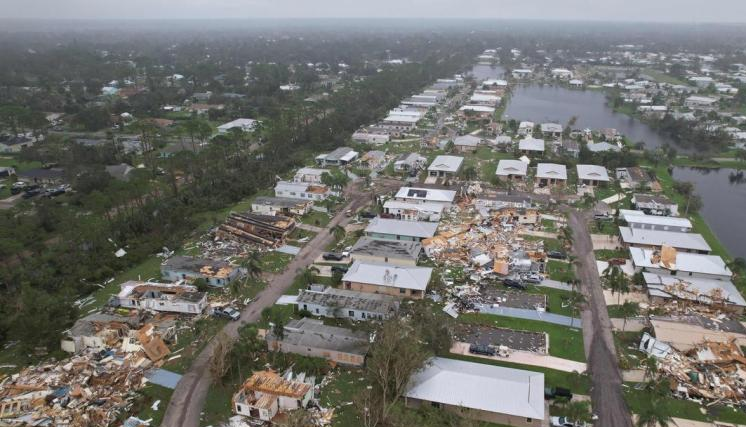
As state and federal officials grapple with the back-to-back storms, they now have to deal with another hurricane-related threat: false information about relief efforts and the cause of the storms.
Tweets from Republican presidential candidate and former President Donald Trump and X platform owner Elon Musk further spread the unverified rumors.
Comprehensive "New York Times" and Bloomberg reported that hurricane "Helene" swept through many states in the United States at the end of September, Wednesday (October 9) evening, Hurricane "Milton" then made landfall in Florida.
After "Helene" hit Florida, Georgia, South Carolina, North Carolina, Virginia and Tennessee, various conspiracy theories and hate speech attacking the government's response to the storm emerged on social media platforms such as X, TikTok and YouTube.
Experts warn that weather-related disinformation can quickly escalate into a real risk and affect aid efforts.
These misinformation quotes irrelevant, misleading or outdated evidence, but the risk is often immediate. Online weather-related conspiracy theories can quickly take a toll offline, disrupting emergency communications and recovery operations. The American Red Cross warned that wild rumors could deter disaster survivors from seeking help from authorities.
Musk and Trump have been spreading conspiracy theories about missing mail-in ballots, as well as claims that government agencies failed to provide relief to affected areas.
"Yes, they can control the weather," wrote Rep. John Green, a Georgia Republican, in a post that has been viewed more than 43 million times. While Green didn't say who she was referring to as "they," longstanding conspiracy theories hold that the U.S. government has the ability to trigger extreme weather events such as hurricanes for the benefit of Allies and themselves.
In an interview with CNN, Vice President Harris, a Democratic presidential candidate, accused Trump of misleading people who are in dire need of help and may not be able to get it.
Jenny King, director of climate disinformation research and policy at the Institute for Strategic Dialogue, said: "Everything is now going to be tied to an election, let alone an unprecedented extreme weather event. In addition to misinformation and disinformation about opposing and delaying climate action, the Internet is awash with political and anti-establishment conspiracy theories."
While refuting the disinformation, U.S. officials are also investigating whether foreign actors are partly to blame.
The Internet falsely accused the Federal Emergency Management Agency (FEMA) of using relief funds to fund undocumented immigrants, offering $750 to storm survivors. Other conspiracy theories claim, without evidence, that the U.S. government took advantage of the disaster to seize private land, or even that the hurricane was a disaster orchestrated by federal officials.
Emergency response officials and extremist researchers warn of the real danger of spreading such deceptive rhetoric during disasters, which could encourage people to ignore evacuation orders or refuse government help. They say hate speech against government institutions can also incite violence against aid workers.
Millions of people have been affected by recent hurricanes in the United States. Georgia and North Carolina, the states hardest hit, are considered to be two of the key states that will determine the outcome of the U.S. presidential election in November.
Hurricane Milton, which hit Florida on October 9, has killed at least 11 people, left millions without power, damaged crops and destroyed homes.

The global electric vehicle market in 2025 is experiencing intense turbulence. Tesla, once a disruptor that reshaped the industry landscape, is now mired in an unprecedented sales crisis.
The global electric vehicle market in 2025 is experiencing …
Recently, Chinese telecom companies Huawei and ZTE signed a…
Recently, according to Xinhua News Agency, Israel's air str…
A strongly worded report from the Equality Trust argues tha…
On November 27, 2025, Alibaba officially entered the global…
The focus of the global financial market in 2025 has always…